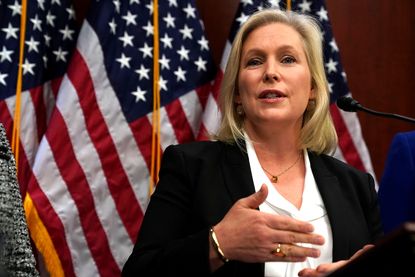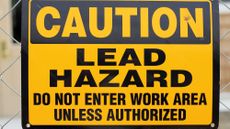Why Democrats are about to get stoked about postal banking
Just try and contain your excitement


"Good policy is good politics." That's an expression one often hears in Washington, usually from someone trying to claim they aren't actually thinking about politics. But while there are politically appealing ideas that make terrible policy and great policy ideas that are hard to sell politically, sometimes the policy and the politics really do line up. One such idea — postal banking �� could become a key part of the Democratic platform in 2020, and might just have a chance of becoming law if Democrats take back control of government in that election.
The idea has been floating around for years, but it's been given new impetus by Sen. Kirsten Gillibrand (D-N.Y.), who announced this week that she'll be offering legislation to put a bank offering simple, low dollar financial services like debit cards, checking and savings accounts, and even small loans, in every post office in America. Here's her rationale:
For millions of families who have no access or limited access to a traditional bank, the simple act of cashing a paycheck or taking out a small loan to fix a car or pay the gas bill can end up costing thousands of dollars in interest and fees that are nearly impossible to pay off. The Postal Bank would solve this problem by putting a retail bank branch in all of the U.S. Postal Service's 30,000 locations, providing low-cost, basic financial services to all Americans, and effectively ending predatory lending nationwide. [Kirsten Gillibrand]
This is good politics because it positions Democrats as advocates for the little guy, up against rapacious villains (the banking and payday loan industries) that no one really likes. And it forces Republicans to defend what is essentially legalized loan sharking, in which people have no choice but to take out loans with double- or even triple-digit interest rates just to stay afloat.
Subscribe to The Week
Escape your echo chamber. Get the facts behind the news, plus analysis from multiple perspectives.

Sign up for The Week's Free Newsletters
From our morning news briefing to a weekly Good News Newsletter, get the best of The Week delivered directly to your inbox.
From our morning news briefing to a weekly Good News Newsletter, get the best of The Week delivered directly to your inbox.
Why is it good policy? To begin with, it addresses an enormous need. In 2014, the Postal Service's inspector general released a white paper on the idea, in which it noted that one in four American households exists at least partially outside the financial system the rest of us take for granted. According to the FDIC, 9 million American households have neither a checking nor savings account and another 24.5 million are "underbanked," meaning they have an account but still have to utilize services like payday lenders or pawn shop loans.
Not having access to ordinary banking, like so much else about being poor, is incredibly expensive. "The average underserved household spends $2,412 each year just on interest and fees for alternative financial services" like check-cashing stores and payday lenders, the inspector general wrote.
The biggest advantage the post office has may be its ubiquity: with those 30,000 locations (actually 31,000, plus "approximately 4,000 additional Contract Postal Units, Community Post Offices, and Village Post Offices," according to the USPS's annual report, which I'm sure you've read), the post office is essentially everywhere. You're not far from one just about wherever you live, particularly in low-income areas where there are no bank branches but plenty of check-cashing stores.
The post office already performs some financial services like selling money orders, and because of its scale it could offer these services at much more reasonable rates of interest and fees than people are forced to pay now. This won't please the payday loan industry. But this is one of those times when it's worthwhile to say to a special interest: Too damn bad. They've gotten rich by exploiting the most vulnerable Americans for long enough.
They've still got allies in the Trump administration, of course, which has given the idea of postal banking all the more urgency. Right now, Mick Mulvaney, whom President Trump installed to run the Consumer Financial Protection Bureau, is busy working to destroy the agency from within, to the pleasure of the payday loan industry, which gave him nearly $63,000 in contributions when he was a congressman. His latest move is a proposal to hide from public view the complaints about banks that consumers have submitted to the CFPB. Mulvaney recently gave the keynote speech at a meeting of the American Bankers Association, encouraging the bankers to keep donating to members of Congress and lobbying so they can maintain their influence.
As shameless as that might be, Republicans count on their advocacy for the country's financial elite to take place mostly out of public view. That's why an issue like postal banking can be politically potent, and why it matters that it's being championed by someone like Kirsten Gillibrand. She's almost certainly running for president next time around, and she is being extremely aggressive on both politics and policy in preparation for that run. Once presidential candidates stake out emphatic stances like this one, they tend to follow through if they end up winning. And Gillibrand isn't the only potential 2020 candidate who supports postal banking; Elizabeth Warren and Bernie Sanders have also advocated it in the past. I wouldn't be surprised if by the time we're deep in the primaries, most of the Democratic candidates have embraced it as part of a package of progressive economic reforms.
That will likely be a key Democratic theme in that election: that when Donald Trump claimed he'd be an advocate for the little guy, he was pulling one of his many cons. Instead, he gave a tax break to the wealthy and corporations, and let corporate power solidify its hold on Washington.
To make that argument in its most powerful form, they have to explain not just what has happened but what they'd do about it. That means new ideas to mitigate the harshness of the economy Republicans have helped build. Postal banking could fit right in.
Create an account with the same email registered to your subscription to unlock access.
Sign up for Today's Best Articles in your inbox
A free daily email with the biggest news stories of the day – and the best features from TheWeek.com
Paul Waldman is a senior writer with The American Prospect magazine and a blogger for The Washington Post. His writing has appeared in dozens of newspapers, magazines, and web sites, and he is the author or co-author of four books on media and politics.
-
 What to know when planning an awe-inspiring hike on the Inca Trail
What to know when planning an awe-inspiring hike on the Inca TrailThe Week Recommends Peru's most famous trail leads to Machu Picchu
By Catherine Garcia, The Week US Published
-
 Lead poisoning remains a threat
Lead poisoning remains a threatThe Explainer The toxin is built into our lives
By Devika Rao, The Week US Published
-
 Should you use a 529 plan? What to know about this college savings option.
Should you use a 529 plan? What to know about this college savings option.The Explainer This tax-advantaged savings account can be used to pay tuition or buy textbooks
By Becca Stanek, The Week US Published
-
 Arizona court reinstates 1864 abortion ban
Arizona court reinstates 1864 abortion banSpeed Read The law makes all abortions illegal in the state except to save the mother's life
By Rafi Schwartz, The Week US Published
-
 Trump, billions richer, is selling Bibles
Trump, billions richer, is selling BiblesSpeed Read The former president is hawking a $60 "God Bless the USA Bible"
By Peter Weber, The Week US Published
-
 The debate about Biden's age and mental fitness
The debate about Biden's age and mental fitnessIn Depth Some critics argue Biden is too old to run again. Does the argument have merit?
By Grayson Quay Published
-
 How would a second Trump presidency affect Britain?
How would a second Trump presidency affect Britain?Today's Big Question Re-election of Republican frontrunner could threaten UK security, warns former head of secret service
By Harriet Marsden, The Week UK Published
-
 'Rwanda plan is less a deterrent and more a bluff'
'Rwanda plan is less a deterrent and more a bluff'Instant Opinion Opinion, comment and editorials of the day
By The Week UK Published
-
 Henry Kissinger dies aged 100: a complicated legacy?
Henry Kissinger dies aged 100: a complicated legacy?Talking Point Top US diplomat and Nobel Peace Prize winner remembered as both foreign policy genius and war criminal
By Harriet Marsden, The Week UK Last updated
-
 Trump’s rhetoric: a shift to 'straight-up Nazi talk'
Trump’s rhetoric: a shift to 'straight-up Nazi talk'Why everyone's talking about Would-be president's sinister language is backed by an incendiary policy agenda, say commentators
By The Week UK Published
-
 More covfefe: is the world ready for a second Donald Trump presidency?
More covfefe: is the world ready for a second Donald Trump presidency?Today's Big Question Republican's re-election would be a 'nightmare' scenario for Europe, Ukraine and the West
By Sorcha Bradley, The Week UK Published